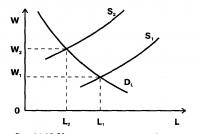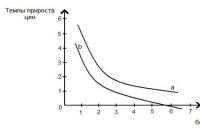Economy Hong Kong. Development of the economy of Hong Kong. Local authorities
Hong Kong is known for open and free economies, a reliable legal system, low taxes, a world-class communications system and an effective transport organization.
Since many investment companies prefer to work in offshore zones due to liberal taxation, and the East is becoming an increasingly promising market for investment, the Maximum approximate of China, the International Financial Center Hong Kong is almost the only choice.
The lack of tax on goods and services and a fixed income tax rate of 17.5% for Hong Kong companies promise good financial benefits. Companies S. registration in Hong Kong Win from providing re-invalidation. This implies international trade between the buyer and the seller through an intermediary company based in the region in which there is no tax on the passage of import and export. But here you need to consider with special attention to the right organization of the accounting system. Companies wanting to trade in goods and services with China or vice versa, create a mediation firm in Hong Kong, which sets bills for the purchase or sale with higher prices than the initial cost of production. Thus, these companies can show a lower or zero profit and at the same time hide the initial value of goods / services. The minimum or zero profit registered by the Intermediary will allow to maintain profits when minimizing income tax. In addition, the possibility of using English and Chinese facilitates interaction and saves costs and time transfer.
What is CEPA.
Even more increases the attractiveness of Hong Kong as a site for doing business in China, a Trade Agreement on Close Economic Partnership (CEPA). According to him, Hong Kong companies ensures simplified access and reducing taxes for the sale of goods in the Chinese market.
CEPA covers three areas:
1. Trade in goods: Almost all goods that are qualified as "done in Hong Kong" can be duty-free to China.
2. Trade services: minimization or cancellation of geographical, financial and proprietary restrictions for a wide range of services.
3. Facilitating the conditions for trade and investment - a number of business simplifying measures between two
Economies.
Today, 273 categories produced in Hong Kong goods, including textiles, electronic and electrical goods, jewelry and clothing are released from fees.
In addition, the liberalization of various sectors, including infrastructure, construction, banking, real estate and logistics, gives new opportunities for the companies formed in Hong Kong. Their business for China has a huge potential. A constant inflow of investments in the PRC in combination with a zero rate in Hong Kong will attract a lot of foreign companies to create headquarters in this region.
International Trade in Hong Kong: Export and Import
The main export items from Hong Kong are machinery and equipment, textiles, clothing, shoes, clocks, toys, plastics, precious stones and printed materials. China accounts for up to half of the total exports from Hong Kong, in second place - the United States (approx. 12%), on the third - Japan (approx. 4.4%).
Hong Kong imported raw materials and food products, various semi-finished products for industry, consumer goods, industrial goods and fuel. With the exception of fuel and food, most of these products are exported after processing.
However, the real basis for the production of goods by companies registered in Hong Kong is China - there are more than 22 thousand factories, or 76% of the total enterprises with foreign capital in China.
Thus, in the province of Guangdong, Hong Kong firms own 80% of enterprises for the production of textiles, shoes, leather goods, toys, clock and electronics. There are 16 thousand such factories, not counting 25 thousand who have any connection with Hong Kong.
Another advantage of the opening of business in Hong Kong for exports to China and other countries is as follows. The product with the inscription "Made in Hong Kong" seems in the eyes of consumers and partners better than the notorious "Made in China". And even knowing that about 60% of the goods passing through Hong Kong were carried out in fact in mainland China, many companies prefer to work with Hong Kong enterprises.
This post is photographer containing links to all my articles about Chinese factories and Hong Kong. It is created for the convenience of searching later.
Have you ever heard the term "dense building?". I was fully realized only in China, looking down from the 69th floor of the highest building in Shenzhen. Here truly revealed the meaning of the concept of "live windows in the window".
I came to China with the inspection of several plants for the production of shallow electronics and spent the first day for acclimatization. I wandered on the Chinese Gorbushka, climbed to the Shenzhen Diwang Community Center, and went to the theme park with miniature replicas of the most famous Chinese sights ...
Have you ever seen real biorobots? Working models? I have seen. In China. At the factory for the production of headphones. They are sitting at the tables and make dozens of identical operations per minute. Their brain is disabled. Their hands are lightningly moving along the specified trajectories. Their fingers are convulsively compress and squeeze in extreme positions. Minute a minute. Hour for an hour. Day after day. Year after year...

Today, the plant was very distinguished from yesterday's: cleanliness in the workshops, brazers on the heads, uniforms on fragile bodies, bugs for visitors, extractor from each soldering iron, triple quality control, their laboratories, sound rooms and a meaningful view of the workers. I got to the modern plant, where they develop and produce headphones for brands such as Japanese Sony and Panasonic, French Thomson, Korean Samsung-Pleomax, English Denn and many others ...

Completing the cycle of articles about Chinese factories, I want to tell about several overwear plants. The gentlemen were presented by large manufacturers of MP3 players, and in fact, their production turned out to be Potemkin villages. I will also show a few hostels where millions of Chinese workers live ...

You probably heard that the electronics is cheaper than just buying in Hong Kong. Today I will show the typical Hong Kong electronics stores and will tell you how I tried to buy a new telephone.

There are 5 Disneyland in the world: in Florida, California, Paris, Tokyo and Hong Kong. Being in Hong Kong, I could not resist the temptation to compare the local Disneyland with Paris and Florida, where I was before. I invite you to the amazing world of Disney, where adults forget that they have long grown out of the pants on the straps, where children's laughter and joy squeeze sadness and experiences, where the border between the fairy tale and the jaws are erased ...
According to Heritage FoundationandWall Street Journalthe economy of Hong Kong is the most liberal economy in the world. This honorable place Hong Kong takes several years.
Its characteristic features:
- No capital restrictions
- Own stable currency (Hong Kong Dollar)
- No currency control
- Minor inflation rate
- Small state intervention in business
- No obstacles for foreign investment
- Hong Kong - the third largest financial center of the world
- The largest duty-free container port of the world
- Is among 1 2 countries with the most developed trading economy
- There are minor restrictions in banking and financial activities, etc.
About 250 banking institutions are located on the territory of Hong Kong. Together with national, in Hong Kong, there are representative offices of foreign banks, including those eligible to issue a loan. Hong Kong has the largest stock exchange. Gold market in Hong Kong - one of the world's largest, most of the transactions are conducted "Chinese Gold "and" Silver Exchange Society ". The lack of a state control in the financial sphere made it possible to such a rapid takeoff of Hong Kong in the global monetary and financial system.
In Hong Kong there are about 50 thousand factories and factories. But the industrial sector of the economy is inferior to its position in the service sector. The main industry is the production of fabrics and clothing (about 30% of exports). Second place occupies the production of electronics. About 90% of industrial products are exported. Hong Kong is one of the world's largest exporters of textiles, clothing, electronic devices and components, hours, toys, etc. Many of these goods are taken from China.
Starting with 1. 969 Hong Kong becomes one of the global financial centers. To date, Hong Kong is the third largest financial center.
In Hong Kong is one of the largest tourist bases serving over1 0 million tourists per year.
The deficit of free land contributes to limited road construction, and the state imposes restrictions on the acquisition of personal transport. The main emphasis is on the development of bus traffic. In addition to buses (carrying more than half of all passengers), trams and ferries in the city there is a network of metro, taxis and minibuses.
International transportation is provided by the seabed and the new airport. Port of Hong Kong is located in the Natural Harbor. The capacity of port terminals in Kai-Chunga makes it the world's largest container port. It is worth considering the moment that the port of Hong Kong is duty-free.
Hong Kong has a trading fleet with displacement of 30 million register gross-tons. Under the flag of Hong Kong, many countries go. On average, about 300 ocean and river ships come to Hong Kong's harbor daily. In coastal waters float1
5 thousand small ships and SAMPANOV boats engaged in coastal transport.
Companies in Hong Kong are an excellent tool to invest in China's market. That is why all the conditions for maintaining a non-resident business have been created. Hong Kong is essentially a window between Europe and Asia.
After China's accession to the WTO, Hong Kong turned into a Chinese export channel to the West countries and the base of many international companies going to take part in the actively developing Chinese economy.
The economy of the city and the state of Hong Kong refers to the number of the most developed and rich economies of the world. According to the human development index (HDI) (13th place in the world) and the gross domestic product per capita (US $ 51,490 according to the 2011 World Bank), this country takes leading positions in international welfare statistics. True, compared with other countries, this welfare is very unevenly distributed among the various layers of the population.
Taking into account the small domestic market, there are only 7 million people, and the economy of this state has almost fully transferred to the mainland China largely depends on foreign trade and services related to it. Hong Kong traditionally takes into account this situation, implementing practically open foreign economic policy and deterrent regulation of the economic system.
At the same time, he plays an important role of the bridge for both financial and economic and real-economic flows in mainland China and from it. While a very liberal market regulation system promotes the foreign economic integration of Hong Kong, in some sectors of the domestic market there are large barriers to the market penetration caused by in particular the small volume of the market, dominance on it in some areas of a small number of local oligopolist enterprises, as well as High prices for real estate. Decisive factors affecting the choice of the placement of production are a high degree of legal security and a successful fight against corruption.
The transfer of sovereignty over Hong Kong People's Republic of China on July 1, 1997 did not have negative consequences for the economy of the city. The position of the special administrative district of China, which uses customs, tax and budget autonomy and having a market financial and economic system, as well as an independent currency system is enshrined in accordance with international law standards until 2047. Hong Kong is still an independent member of the General Agreement on Tariffs and Trade (GATT) / WTO (WTO) and the Organization of Asia-Pacific Economic Cooperation (APEC), as well as Associate Member of the UN Economic and Social Commission for Asia and Pacific (ESCAP), A member of the Asian Development Bank and plays a recognized role in the Financial Stability Forum.
Hong Kong was founded for trading. This fact is still an important key to understanding its economy and society. Nowadays, every second hired employee of the country is busy in the field of trade and related commercial services, such as financial, logistics and others. In recent years, there has been a particularly rapid increase in the importance of the spheres of finance and tourism for the economy as a whole. Hong Kong is one of the most important financial centers in the world. More than 70 of the world's largest banks are concentrated in the city; 199 Accredited Banks and 62 Representative Offices provide him with one of the highest density density densities in the financial sector. The Hong Kong Stock Exchange is the sixth place in the world in market capitalization. In 2011, 42 million people visited the country, which made it one of the most important tourism centers in Asia.
With the opening of the economic curtain of the mainland China in the 1980s, the economy of Hong Kong survived a deep structural transformation. Production facilities focused on the release of consumer goods were almost completely moved into a pearl river bordering with the city, and enterprises of the service sector came to their place. Currently, the share of the processing industry in the structure of the country's GDP is only 3.2%, and all of its other part of the wholesale and retail trade, import and export, gastronomic and hotel business (32%), the scope of financial and commercial services (14% ), the scope of insurance and real estate operations (14%) and the sector of socio-administrative and individual services (about 21%). Nowadays, local production of goods is limited to the release of only several types of high-quality products (for example, an advanced, capital-intensive electronics).
In parallel with this, over the past 40 years, the conversion of the structure of the Hong Kong market was also converted. Traditional British Type Conglomerates, remaining from the colonial era, gradually acquired by Chinese family enterprises. So, first of all in the real estate sector, which is an important source of income, both for the government and for the development of many other sectors of the economy (in particular retail), the dominant position occupies a small number of concerns based on family associations.
Economy Hong Kong It plays an important role not only because it is the leading trading and financial center, but also because Hong Kong serves as a bridge for the economic exchange of mainland China with the rest of the world. Hong Kong is an essential transshipment port for Chinese foreign trade. At the same time, the incentive to its use for trading partners are primarily lower information expenses, tax breaks and preferential tariffs, high technological equipment of the port, as well as a higher density of transport. After opening the mainland Chinese curtain, entrepreneurs of the city, among the first, began to invest in special economic zones in the pearl river delta, based in the late 70s of the last century. Currently, Hong Kong belongs to almost 90% of all foreign investments in these economic zones. The overwhelming part of the enterprises created with the involvement of these investments is the company for the production of complex equipment (OEM) for foreign manufacturers of brand products or the enterprise for the processing of Davalic raw materials.
However, due to an increase in the level of wages and the need for strict observance of labor protection and environmental standards, the benefits in the costs of production for enterprises of the pearl river delta decreased significantly. Therefore, many entrepreneurs intend to move their production or deep into China, or to other countries with a cheaper workforce.
In addition, Hong Kong plays for China an outstanding role of a financial intermediary. It is the largest source of direct investment in the economy of this country. Taking into account the mechanisms of capital controls existing for enterprises of mainland China, the city provides them with access to international capital, and foreign investors are the possibility of financial participation in the Chinese economy. Thus, in August 2012, 710 enterprises in the Hong Kong Stock Exchange included 710 enterprises of mainland China, which accounted for about 57% of the market capitalization of all companies whose shares are quoted on this stock exchange.
The financial and economic integration of Hong Kong and Mainland China is becoming increasingly close. Since 2004, therefore, the possibility of transactions in the financial market of the city in Chinese yuan is introduced. Important stages were introduced from 2007. China's financial institutions to issue bonds denominated in Chinese yuan and launched a pilot project of regional-limited implementation of trade transactions in the national currency in 2009, the list of enterprises of this project Expanded in December 2010 to 70 thousand. In July 2010, the interbank transfer of assets in Chinese yuan became possible in Hong Kong; At the same time, the existing restrictions on the acquisition of Chinese currency by enterprises of the city were removed.
There are few other national economies in the world, so intensively integrated into the world economy and at the same time so susceptible to foreign economic influence as the economy of Hong Kong. 98% of the export of this country make up re-export, more than half of which falls on re-export to mainland China. The volume of foreign trade of the city has risen again after some reduction in 2009. In 2011, the total trading increased compared with the previous year by 11%, reaching 655 billion euros.
The most important trading partners of the country, along with China, are the USA, the countries of the European Union, Japan, Singapore and Taiwan. The largest trading partner of Hong Kong among EU countries is Germany. At the same time, for several years now there is a tendency to a relative increase in the trade turnover of the countries of East Asia, by reducing the volume of trade with the United States and European countries.
Hong Kong is both one of the most important target markets for foreign direct investment, and one of the largest sources of foreign direct investment. So, in 2011, Hong Kong took 4th place in the world in the influx of foreign direct investment, the volume of which amounted to 83 billion US dollars (+ 17% compared with 2010).
The nominal value of foreign direct investment in the economy of Hong Kong amounted to 1068 billion US dollars at the end of 2010, one third of which was invested from the mainland China and the British Virgin Islands. Hong Kong himself, as of the end of 2010, owned direct investments abroad during the last financial and economic crisis, the economy of this country demonstrated its strength, and the real reduction in GDP in 2009 was 2.5%, i.e. less than the predicted, and already in 2010 and 2011, GDP growth was made by 6.8% and 5%, that is, i.e. More predicted in accordance with the long-term growth chart (4%).
The unemployment rate in the country is only 3.2%, which almost corresponds to the full employment of the population. If in 2011 the inflation rate was another 5.3% due to the increase in food prices and rental housing, in the first half of 2012 they decreased to 4.7% due to a decrease in the rate of imported inflation and reduce food prices. Positive balance in this direction is due primarily to high domestic demand, which is maintained at the expense of numerous rich tourists from the mainland China and major government investments in infrastructure development projects.
However, external economy Hong Kong Developed during this period less positive. So, in the first 8 months of 2012, the export volume of this country decreased by 0.2%. Especially decreased exports to Europe (from January to August 2012 by 16.7% compared with the same period last year).
The short-term economic prospects of Hong Kong are evaluated very pessimistic, especially from his government. The fact is that such a forecast provides for further deterioration in the foreign economic environment against the background of the ongoing debt crisis in the eurozone and the continuing weak conjuncture in the United States. Along with the danger of a possible breaking bubble in the real estate market, the gloomy socio-political consequences of the rise in real estate prices are also predicted. In order to restrain the rise in prices in the real estate market, the Government of Hong Kong implemented a sharp increase in taxes on the purchase of real estate persons who are not citizens of the country.
The economy of Hong Kong is very different from Chinese, and the legislation is largely created in the image and similarity of the British and is also based on the general right. Free market, lack of currency control and state regulation and high level of financial sector - all of these interesting features of the region make Hong Kong companies with an attractive tool for foreign economic activity.
The economy of the territory is based on the free market, low taxation and non-interference of the state in the economy. Hong Kong is not an offshore territory, it is a free port and does not charge customs charges on imports, there is no value added tax or its equivalents. Excise taxes are charged only with four types of goods, regardless of those imported them or local production. These are alcoholic beverages, tobacco, mineral oil and methyl alcohol. Hong Kong is an important center for international finance and trade, and the level of concentration of headquarters is the highest in the Asia-Pacific region. According to the indicators of the shower gross domestic product and gross urban product, Hong Kong is the richest city in the PRC.
The taxation system of Hong Kong was formed on the sample of English and largely inherited the principles of the complex of measures of the British Commonwealth in the field of tax policy adopted in 1947. In Hong Kong, there is no division of companies for resident and non-resident, and the territorial principle of taxation is adopted. This means that Hong Kong is subject to taxation only if the revenues are obtained from a source in Hong Kong or the activity to obtain this income was carried out in Hong Kong. If the company did not carry activities in Hong Kong and did not receive income from sources in Hong Kong, it is not subject to taxation. In Hong Kong, there are no capital gains taxes, dividends, interest, royalties derived from abroad or shipped abroad. The income tax rate for companies leading to Hong Kong is 16.5%.
Continuing the policy of the British administration, the Government of Hong Kong gives priority in managing the economy of the free market and the private sector. Since 1980, the Government has played a passive role in the framework of the official policy of positive non-interference. Hong Kong is often leading as an exemplary example of capitalism Laissez-Faire, embodied in practice. Since the emergence of an economic freedom index in 1995, Hong Kong annually takes first place for 13 years. He also ranks first in the report "Economic Freedom in the World".
Hong Kong has a small amount suitable for the cultivation of the Earth and scarce natural resources, so it is forced to import a beneficial part of food and raw materials. Hong Kong takes the eleventh line in the list of the largest shopping actors in the world, the total cost of its import and export exceeds the gross domestic product of the territory. As of 2006, Consulates of 114 countries operated in Hong Kong - more than in any other city of the world. A significant part of the export of Hong Kong is re-export, that is, products produced outside the territories of the territory mainly on the mainland China, and distributed through Hong Kong. Even before the transfer of the sovereignty of the People's Republic of China, Hong Kong has established advanced trade and investment relations with mainland China. Autonomous status of the territory allows it to perform the role of a gate for investments and resources heading to the continent.
Hong Kong currency is the Hong Kong dollar. Since 1983, he has been tied to the US dollar. The currency rate can fluctuate in the corridor between 7.75 and 7.85 Hong Kong dollars for one American. Hong Kong Stock Exchange - the seventh largest stock exchange in the world, in February 2007 its capitalization was 1.69 trillion US dollars. By the number of IPO in 2006, Hong Kong Exchange ranked second in the world, yielding only London. According to the 2007 financial centers index, the city of London City in order to assess the competitiveness of 46 financial centers worldwide, Hong Kong is the third best financial center in the world and the first in Asia.
Today, the service sector gives more than 90% of the gross domestic product of Hong Kong.
After the Second World War, the investigating industrialization of Hong Kong the dominant sector of the territory was the industry. In the 1970s, the economy of Hong Kong annually grew on average by 8.9% thanks to exports. In the 1980s, a quick transformation occurred in the economy of Hong Kong, as a result of which the sector of the services became the basis of the economy. The average annual GDP growth during this period was 7.2%. During this period, most of the production was transferred to the mainland China, and now the contribution of industry in the economy is only 9%. After in the 1990s, Hong Kong became a recognized financial center, economic growth slowed to 2.7%. Thanks to the turbulent economic growth and rapid industrialization, Hong Kong entered the fourth of the "Asian Tigers", or "Dragons", along with Singapore, South Korea and Taiwan
This was followed by a period of recovery and growth, which in 2000 was 10%, despite the continued deflation. In 2003, the economy of Hong Kong had a negative impact of an outbreak of atypical pneumonia (SARS), which is why the growth of the economy was only 2.3%. However, due to the restoration and growth of external and domestic demand in 2004, the economy again began to grow confidently, with the advantage of the cost increased the competitiveness of Hong Kong exports. The deflation period lasting 68 months ended in mid-2004, when the inflation rate has stabilized near the zero mark. Since 2003, "Individual visits regimen" has been introduced, which delivered citizens of the continental part of the PRC from the need to join the tourist group to visit Hong Kong. As a result of this measure, the flow of tourists from the continent has positively affected the income of the tourist industry of Hong Kong. The economy continues to grow confidently thanks to consumer confidence and trade growth. In Hong Kong, there is a low level of taxation of companies and individuals.






